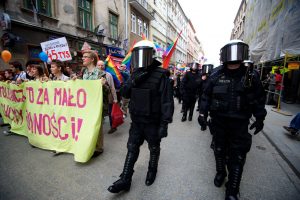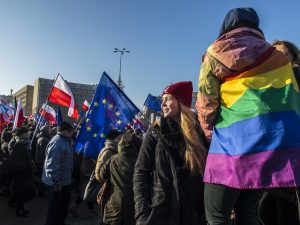By guest contributor: Apurva Ambasth*
Discrimination and vilification of members of the LGBTQ+ community are not untoward or unheard of, rather it is, in fact, one of the most commonplace occurrences around the globe. The rights of the LGTBQ+ Community are in danger due to increasingly violent rhetoric in Poland. One-third of the country, around 100 municipalities have declared themselves “LGBTQ+ free zones.”
This article discusses the situation of the LGBTQ+ community in Poland and provides an insight into the deteriorating relationship between Poland and the European Union due to its discriminatory policies.
Political Homophobia in Poland
The right-wing Law and Justice party (PiS), won the parliamentary election in October 2019 for a second term. One of the major themes of the election campaign of the party revolved around the opposition of civil partnerships, same-sex marriage, and adoption rights for same-sex couples. The party finds its ally in the Roman Catholic Church for promoting “traditional family values” and establishing Polish national values. A poignant example of this alliance is the Archbishop of Kraków, Marek Jędraszewski, stating that there is a “neo-Marxist rainbow plague” affecting the country. The chairman of PiS, Jarosław Kaczyński, has described LGBTQ+ rights and “gender theory” as a “threat to the nation” at a conference organized by the lay group Catholic Action. This strategy kick-started unbridled political homophobia and led local governments to pass anti-LGBTQ+ resolutions.
The rampant homophobia was exacerbated by the re-election of Andrzej Duda as the country’s President in July 2020. Duda, during his election campaign, had said that the promotion of LGBTQ+ rights is an “ideology more destructive than communism” and pledged to ban same-sex marriage and disallow same-sex couples to adopt children. The President brought his promises to fruition with the introduction of a new law in March 2021, banning same-sex couples from adopting children even as single parents.

The Polish police have since made widespread arrests under Article 196 of the Criminal Code, violating the rights of LGBTQ+ activists. Art. 196 provides that a person who “offends the religious feelings of others by publicly insulting a religious object or place of worship” may face up to two years in prison. The misuse of overly broad and vague blasphemy laws to curb the freedom of expression of citizens is a gross violation of freedom of expression protected by Article 19 of the International Covenant on Civil and Political Rights and Article 10 of the European Convention on Human Rights (ECHR).
However, the Polish Commissioner for Human Rights (Ombudsman) has criticized the heteronormative standards of the “Regional Charter of Family Rights” ideology. Building on the chilling effect of the anti-LGBTQ+ resolutions, the Polish Commissioner for Human Rights has challenged the resolutions or family charters in the Administrative Courts. The Ombudsman has argued that the resolutions stand in a clear violation of the Polish administrative law, the Polish Constitution, and the European Convention on Human Rights. The case of Bayev and others v. Russia was cited as reference to the decision of the ECHR observing that states have an obligation to take into account developments in society such as the inclusion of same-sex relationships within the concept of “family-life.” The Ombudsman saw a few victories in the courts although these rulings have been appealed before the Supreme Administrative Court.
International Response
“LGBTQ+ free zones” in Poland were met with criticism from human rights organizations and activists all over the world and especially the European Union. Ursula von der Leyen, the head of the European Commission in her state of the union address, stated that Poland’s “LGBTQ+ free zones” are “humanity-free zones” that have no place in the European Union and pledged to build “a union of equality.”
European Commissioner for Equality, Helena Dalli, stated that “EU values and fundamental rights must be respected by Member States and state authorities.” Following the statements made by Helena Dalli, the European Commission decided to stop funding six LGBTQ+ free zones in Poland. Following suit, as a sign of support and solidarity to the LGBTQ+ community, Norway cut ties with Poland and announced that all the municipalities that declared themselves as LGBTQ+ free zones would no longer be getting grants under the program funded by Norway, Iceland, and Liechtenstein.
The European Union Activism
The Polish anti-LGBTQ+ declarations are in contravention of the treaties of the EU, the EU Charter of Fundamental Rights, and the Employment Equality Directive. The EU law proactively fights discrimination and ensures equal treatment of all people, regardless of their sexual orientation. The European Parliament has declared that the European Union is an “LGBTQ+ Freedom Zone,” and the EU has been deliberating taking action against Poland after the ban on adoption by same-sex couples.
Article 10 of the Treaty on the Functioning of the European Union, along with Articles 2 and 3 of the Treaty on European Union provide for the principle of equality and the prohibition of discrimination on the basis of sexual orientation. Article 19 of the TFEU empowers the EU to adopt measures to deal with discrimination on grounds of sexual orientation and gender identity.

The Commission can turn its words into actions by launching an investigation into the violations of the common values mentioned in Article 2 of the Treaty on European Union by Poland. Article 7(1) of the Treaty provides for the infringement procedure and states that a majority of four-fifths of its members can determine the breach of Article 2. Thereafter they can determine the nature of sanctions to be put on Poland, putting forth a serious warning pertaining to the termination of Poland as a member state in the Union.
According to the ILGA Europe country ranking report, Poland ranks the worst amongst all the member states of the European Union for LGBTQ+ rights. Poland has also seen a sharp rise in the migration of queer people in the face of brazen discrimination and institutional violence. Now is the time for the European Union to take stern measures instead of merely paying lip service in the name of LGBTQ+ activism.
The homophobic policies of Poland are not unanimous throughout the country. There has been strong opposition to the ruling party’s ideals. Warsaw has seen a face-off between Polish nationalists and LGBTQ+ activists. This has led to worsening living conditions and non-recognition of the fundamental rights of queer people. However, the dangers are not limited to Poland itself. Of late, Hungary has seen a sharp rise in the enactment of homophobic laws and the erasure of LGBTQ+ rights. In the light of such dreadful events, the EU can be looked on for stricter actions that would bring forth change and usher equality and justice for the LGBTQ+ community.
* Apurva Ambasth is an undergraduate penultimate year student of B.A.LL.B.(Hons.) at NUSRL, Ranchi, India. Her areas of interest include human rights, criminal, and international law.
Photos
“Marsz Równości :: Świętem Miasta” by Gosia Malochleb is licensed under CC BY-NC 2.0
“Pride parade with riot police in Krakow, Poland” by bgolub is licensed under CC BY-NC-SA 2.0
“#KOD demonstration in Warsaw against surveillance law and recent government policy” by gregor.zukowski is licensed under CC BY-NC 2.0
